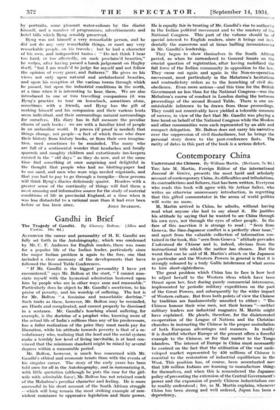Gandhi in Brief
Aurnotrcm the career and personality of M. K. Gandhi are fully set forth in the Autobiography, which was condensed by Mr. C. F. Andrews for English readers, there was room for a popular life of the Indian leader, particularly since the major Indian problem is again to the fore, one that included a clear summary of the developments that have followed the Round Table Conferences.
" If Mr. Gandhi is the biggest' personality I have yet encountered," says Mr. Bolton at the start, " I cannot asso- ciate myself with the hysterical admiration bestowed upon him by people who are in other ways sane and reasonable." Particularly does he object to Mr. Gandhi's asceticism, to his praise of poverty, and his worship of suffering. The last is for Mr. Bolton " a feminine and masochistic doctrine." Such traits as these, however, Mr. Bolton may be reminded, are Hindu and complicated, and cannot properly be dismissed in a sentence. Mr. Gandhi's teaching about suffering, for example, is the doctrine of a prophet who, knowing more of the actual life of India's millions than any of his predecessors, has a fuller realization of the price-they must needs- pay for liberation, while his attitude towards poverty is that of a re- volutionary who, realizing that the land and the social system make a terribly low level of living inevitable, is at least con- vinced that the minimum standard might be raised by several degrees within a measurable- period.
Mr. Bolton, hoViever, is much less concerned with Mr. Gandhis ethical and economic tenets than with the events of his singular career. The story of the early years has been told once for all in the Autobiography, and in summarizing it, with little quotation (although he puts the case for the girl- wife with admirable force), Mr. Bolton has not retained much of the Mahatma's peculiar character and feeling. He is more successful in his short account of the South African struggle —which will long remain the most striking example of non- violent resistance to oppressive legislation' and State power.
He is equally fair-in treating of Mr. Gandhi's rise to authority in the Indian political movement and to the mastery of the National Congress. This part of the volume should be of special interest to English readers, since it brings out inci- dentally the numerous and at times baffling inconsistencies -in Mr. Gandhi's leadership.
They began to show • themselves in the South African period, as when he surrendered to General-=Smuts on the crucial question of registration, after having mobiliied the full force of the Indian community in opposition to the law. They - came out again and again in the Non-co-operation movement, most particularly in the Mahatma's hesitations and contradictory orders as to the launching of civil dis- obedience. Even more serious—and this time for the British Government no less than for the National Congress—was the Mahatma's course of conduct in London during the tortuous proceedings of the second Round Table. There is one un- mistakable inference to be drawn from those proceedings. They could not conceivably have yielded a tolerable measure of success, in view of the fact that Mr. Gandhi was playing a lone hand on behalf of the National Congress while the Moslem and other communities were each represented by an able and compact delegation. Mr.. Bolton does not carry his narrative over the suppression of civil disobedience, but he brings the personal story down to the post-conference fasts. The rarity of dates in this part of the book is a serious defect.










































 Previous page
Previous page